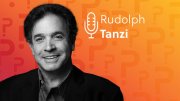How does the air we breathe affect our body’s reaction to COVID-19? Early on in the pandemic Francesca Dominici, Gamble professor of biostatistics, population, and data science at the Harvard T.H. Chan School of Public Health, explored this question with her team. On this episode, she discusses the links between fine particulate matter in the air and COVID-19 outcomes. Dominici also discusses the pressure placed on scientists by government and media during public-health crises—when answers are needed before conclusions exist. She concludes by describing how the government could help scientists reach conclusions faster, by collecting and releasing more (and better) data to scientists.
Dominici, co-director of Harvard's data science initiative, previously demonstrated how “big data” can be used to reveal connections between pollution and health, and used cutting-edge data analysis to validate the findings of an earlier landmark study of pollution's health effects that had since come under political attack. In 2015, she warned that Environmental Protection Agency standards were not sufficiently stringent. More recently, she showed that air pollution can have systemic health effects, including several beyond the known effects on respiratory health and cardiovascular disease. To learn more about the mechanisms linking air pollution to poor health, read the Harvard Magazine feature article, “Clearing the Air.”
A transcript from the interview (the following was prepared by a machine algorithm, and may not perfectly reflect the audio file of the interview)
Jacob Sweet: As COVID-19 spread across the world, it quickly became one of the largest public health crises in modern history. At the time of this taping, on September 3, 2020 the virus has killed more than 186,000 people in the United States alone, a number that will likely eclipse 250,000. But many of the preexisting conditions that increase the risk of death in those with COVID-19 are also affected by long-term exposure to air pollution. How does the air we breathe affect our body's reaction to COVID-19?
To answer that question and more we'll speak with Dr. Francesca Dominici, Gamble Professor of Biostatistics, Population, and Data Science at the Harvard T.H. Chan School of Public Health. She also serves as the co-director of the Harvard Data Science Initiative—a cross-campus effort to develop new data science methods and to better harness the power of data science and research. In her own research, she leads several interdisciplinary groups of scientists aiming to address important questions in environmental health science, climate change, cancer research, and health policy. Welcome Professor Dominici.
Francesca Dominici: Thank you for having me.
Jacob Sweet: I was interested in one of your papers from March involving possible links between COVID-19 outcomes and air pollution. Would you mind just sharing what led you to connect the two subjects?
Francesca Dominici: Yes, sure. I think I should say that I've been leading a large team at the School of Public Health for many years. That includes students, faculty, and post-doctoral fellows, where we have assembled the largest ever national data platform on short- to long-term exposure to air pollution linked to mortality and hospitalization data for the great majority of the U.S. population older than 65, as well as data on social economic information and demographics.
So when we learned about the pandemic and we went in lockdown, clearly I started to think with my colleague, how can we leverage our own expertise and our own data to help understand how to respond to the pandemic. The other thing I should mention is two years ago, I also co-advised a PhD student in the Department of Environmental Health, JonguenRee, which with her advisor, David Christiani who is a pulmonologist at Mass General and also professor at the School of Public Health. We provided the first evidence of a link between long-term exposure to fine particulate matter and acute respiratory distress syndrome.
And at that time, for me, I knew very little about acute respiratory distress syndrome, but now we all know that acute respiratory distress syndrome is actually one of the main causes of that COVID-19. So considering my prior experience on data and epidemiological study on PM 2.5, the link that we have generated between PM 2.5, so particular matter and health outcome in acute respiratory distress syndrome, I started to get interested to see whether air pollution could make the health outcome with COVID-19 worse. I also wanted to emphasize that the research that we conducted was not to assess whether PM 2.5 or pollution will increase the spread of COVID-19.
I think that is a very important research question, but I felt that because of the testing practice and inaccuracy of the data, it was a really hard question to address. Maybe it's a little bit easier now, but now back in March, it was really hard. So what we wanted at least to start was to try to address the following questions: So if you have been living in a geographical area where in the last years you have been consistently exposed to air pollution, and then you contact the virus, are you going to have a higher chance of dying due to the virus? And the hypothesized mechanism is that because we have an overwhelming amount of evidence that PM 2.5 affect our lungs and our cardiovascular system, the hypothesis was that if you have been breathing air pollution air for very long time, you have already compromised that your lungs and cardiovascular system are inflamed.
And then if you're contracting the virus, it's kind of like you're getting a double hat. And so you might have a higher risk of that. So that was really how we got to that question and how we basically stopped doing everything else and tried to get the best possible data methodology to address this question.
Jacob Sweet: And can you describe what is fine particulate matter and where does it come from?
Francesca Dominici: Yeah, of course. So fine particulate matter, these are very tiny, tiny particles. Their diameter is smaller than one hundredth of a human hair. So they're really, really tiny. The tinier they are, the more dangerous they are, because when you breathe them, they penetrate very deep into your lungs and also can get into your bloodstream and cause inflammation. So it's different from what we call coarse particles or dust. Like if you're walking and there is a construction site, you feel these particles, but these are larger particles. So you can kind of filter it. Unfortunately, very small particles, fine particulate matter is not something you can smell or something you can cough, right?
Now where they're coming from the two major sources are fossil fuel combustion. So that means power plants and also motor vehicle emission, but also any type of really fossil-fuel combustion. And other unfortunate really source of fine particulate matter right now are also the wildfires that are coming in California as a result of not only burning trees, but also burning objects and buildings.
Jacob Sweet: And how does that impact acute respiratory distress syndrome?
Francesca Dominici: Well, from our side we didn't want to do the physiology or the biology of how exactly that happened. The study that we did two years ago was an epidemiological study and we used observation data. And basically what we found is that if you look at year-to-year variation in levels of fine particulate matter, you will see that these are associated with year-to year-variation in hospitalization with acute respiratory distress syndrome and approximately one-third of this hospitalization, unfortunately, results in death. The mechanism why that happened, I think it's pretty much consistent to what we all know about the mechanism of how fine particulate matter affects our health.
And again, they are really, unfortunately, because they penetrate very deep in our lungs and the cardiovascular system can indeed cause all kinds of inflammation and therefore could have very, very unfortunate consequences.
Jacob Sweet: So how did you find that air pollution and COVID-19 were related? What were the effects on places with more particulate matter in the air?
Francesca Dominici: Yeah. So first of all, it's really important that to point it out, before I make assessment and quantification of this adverse effect—the study we conducted was the first study ever conducted on the topic. And as a consequence, also has a really important limitation and the important limitation is that unfortunately, on a national level, the only data that we have on COVID-19 number of deaths is aggregated at the county level. So we have, for every day, the total number of people that died for COVID-19 in a particular county in the United States. So then what we did is because of our ongoing work and we did have levels of fine particulate matter actually for every one-kilometer grid in the United States.
So we were able to aggregate the data up to a county level. And then we were able to get a lot of information on population density, stage of epidemics, demographic, persons or people in poverty and so on, right? But the limitation I wanted to mention is that we would only be able to see whether county-level average in pollution were related with county-level number of deaths in COVID-19. We were not able to do an analysis that we would have loved to do, but data are not available at individual level, right?
When you do an analysis that you are comparing and relating group-level data, we say in statistics that these analyses could be affected by what we call ecological bias. Why? Because we could not take into account all the individual-level risk factors. So like race and poverty and age and so on. So we are now in the process of gathering additional individual-level data so then we can overcome the limitation of this study. Now having said so, with all of these caveats—and as a scientist, I wanted to be absolutely transparent that again, this is an important limitation—is that what we found is if you take two counties, right? And let's say for a moment that these two geographically areas are as similar as possible with respect to percentage of people in poverty, their population density, their racial composition. And so let's say for a moment that this is the only difference between these two counties—that is, one county had on average one unit higher level PM 2.5 than the other counties. The county that is a little bit more polluted had between an 8% and 11% higher increase in COVID-19 mortality rate. So these effects are actually really high.
And when people asked me will you expect that this is resolved, well, with all of the methodological challenges, I'm actually not literally surprised that this factor was so high because we're talking about small change in fine particulate matter. Long term exposure to fine particulate matter could increase your mortality for COVID-19 substantially. I'm not super surprised because again, this is consistent while we were thinking about this double edge hypothesis, right? You have been being breathing polluted air for very long time, your lungs are already compromised. You are getting COVID-19, which definitely attacks our lungs. And so therefore you have a higher risk of that for COVID-19.
Jacob Sweet: That's very interesting. And I'll get to the challenges of disseminating science during COVID-19 in a bit, but relating to your findings on particulate matter and COVID-19, can you talk about the national environment around environmental protection that is occurring right now? I saw that some of the regulations have actually been lapsing recently.
Francesca Dominici: Yes. And I think that this is also why I think that the study, that in their consideration, they're going down the peer review right now, had attracted so much attention because this preliminary evidence arrived a time where there is tremendous amount of debate about environmental regulation. So to unpack that now, even prior to COVID-19, and let's imagine for a moment the world without COVID-19, right? So even absent COVID-19, we have an enormous amount of evidence about the adverse of the effects of fine particulate matter.
My team would publish a study, was a study of 570 million observation individual level record that shows that the long-term exposure to fine particulate matter caused an increased risk for mortality, even a level much lower than the National Ambient Air Quality Standard. So there is an enormous amount of evidence saying that the core international ambient air quality standard for fine particulate matter. So National Ambient Air Quality Standards are what is considered to be the safety standards and now are set at 12 micrograms per cubic meter, are not safe.
And the mandate of the Environmental Protection Agency before the Trump administration, the general process was that the Environmental Protection Agency would appoint a large group of scientists. This large group of scientists will review the evidence as to whether or not the National Ambient Air Quality Standards for fine particulate matter were safe. And based on the evidence, will recommend as whether or not lowering the National Ambient Air Quality Standards. Unfortunately, under the Trump administration, there has been a consistent attempt to not look at science. So the Scientific Advisory Board was all fired. And they concluded, in the middle of the pandemic, that there was not enough evidence of adverse effect to fine particulate matter and so they actually are recommending not to lower the National Ambient Air Quality Standards.
And so this has been a very controversial time, not only that, but as we all know at the same time there has been a consistent rollback of all environmental regulation that we know adversely affect our health. So this study arrived out, in a certain way, at the point where from environmental activists was a tool to say, look, there is evidence that PM 2.5 make COVID-19 even worse, it is absolutely crazy not to lower the National Ambient Air Quality Standard. And at the same time, it was a very unwelcome news for the people that were actually in favor of rolling back environmental regulation at this time of epidemic to provide an economic boost. So we just arrived at a good time or at a bad time. It really depends on what are your political orientation and preferences.
Jacob Sweet: Wow, well, there's a lot going on there. Can you talk a bit about your role as a scientist during the pandemic? What were the pressures you faced from the media and from the government for concrete immediate answers and how did you respond to that?
Francesca Dominici: Yeah, I have to say it was an enormously stressful period of my life, March, April, May, June, July. It's getting little better now. Very stressful, because the reality is, so in one hand, as a scientist and professor of public health and a data scientist, I felt, and someone who has been dedicating their career on data science and assimilating out the effects of air pollution, sitting on the largest ever national data on this topic, I felt an enormous responsibility to look at this topic and to see whether fine particulate matter were increasing the risk of mortality for COVID-19. But at the same time, especially March and April, but still now, clearly addressing this question with high scientific rigor is near impossible because data are not of the quality that we want.
First of all, the unfortunate news is that data is still accumulating. That's really still happening every day. There are inaccuracies in the coding of these data. There are, as I mentioned, enormous challenges because you cannot do an individual level analysis, you have to do an ecological level analysis. But still, I felt if we are not tackling this topic or at least raising this issue, I feel that science moves forward by trying to attempt and trying to tackle difficult questions. So we need that. We paused the paper as a pre-print too, because the other issue is that peer review takes six months a year.
So we wanted to know, as soon as possible, we made all the data available, we made all the code available and then really the stressful part arrived, because in one hand, the press and the media wanted from us to have the perfect answer and the preferred answer would be, yes, air pollution increases the mortality risk of COVID-19, right? But we don't have the perfect answer because there are a tremendous amount of uncertainty. And so I had to walk this very fine line where I say, yes, this is a preliminary study. That's what we are finding now. But again, we need more data. We need more science. Versus say, well, but you are a Harvard professor, are you telling me you don't know? What do you mean? You're like you're unsure.
And then clearly the criticism from the interested party in terms of say, Oh my God, now Harvard is coming up with a study that PM 2.5 makes COVID-19 worse at the time where the Trump administration is saying, "We don't want to lower the National Ambient Air Quality Standards. Let's make sure that we invalidate the study as much as possible, that the study is not rigorous." And of course, there are a lot of reasons to say that the study is not rigorous because again, this type of study at time of pandemics are very, very preliminary.
So yeah, I mean, I think that how you juggle that, I think it's something that no one can teach you. It was the first in my life where actually I talked to the press about a study that wasn't peer reviewed. I would have never done that in the past. And so it is stressful, but on the other hand, I do think that at the time of a lot of misinformation, a lot of misinterpretation, I do think that the world is also looking for trusted source to talk about this issue. And at some point I felt it was better that even with uncertainty if it was coming from me, than if it was not coming out at all.
And the other thing that I try to judge is the worst consequences of talking about a study that is preliminary is that if the conclusion of the study could lead to harm, in this context, the conclusion on the study could never lead to harm because basically what the study is saying is, "Hey, it's really possible that PM 2.5 is bad for you if you have COVID." So I think that it's still a very important public health message.
Jacob Sweet: And in the future, how can government and organizations across the country respond to science in real time and produce data in a way that will help feature crises like this? Is there something that you have in mind?
Francesca Dominici: Yes, absolutely. I was actually thinking and having a conversation about this, this morning. So interesting. So I think that we're all facing, politicians, public health agencies, they are making life or death decisions based on evidence. And so we need to provide the best possible evidence. We provide a lot of this best possible evidence with data science, and there is no good data science without good data. Okay. So everything, not everything, but I would say a great majority of the decisions that we're making about whether or not to reopen, whether or not send our kids to school, how we are going to evaluate the safety of the vaccine, how are we going to decide to who we're going to give a vaccine, is based on evidence that is produced by data science that comes from data.
And I think what we should have done is been prepared. And what we need to do is to be better prepared, that when we have another emergency, another pandemic, which is going to happen, we are ready to collect and link data from day zero in an anonymized way. And all of our research is tentative. All of our research is preliminary and the main reason is not because we don't have the tool to then understand how you analyze the data, it is because we don't have good data. And so, if you think about it, from a technological viewpoint, it is absolutely feasible to set a system such that real-time within the same platform, every single case, every single death, at individual level is assembled within the same platform that is accessible with all of the privacy concerns to scientists.
So right now we don't have that and we are very far from that. We know that we cannot access, even as a Harvard Professor, I cannot access individual level record, of even at the Harvard-affiliated Hospitals, right? So that, to me, is something that we have to be prepared to have accurate real time data collection. So that when a crisis occurs, we are prepared to respond to that by providing the best possible evidence, instead of giving tentative answer as I'm doing, as many of my colleagues are doing, because we cannot do otherwise.
Jacob Sweet: So more data, better data, better assembled data. That sounds like a good solution to the problem.
Francesca Dominici: Absolutely.
Jacob Sweet: Well, thank you so much, Professor Dominici. I really appreciate your time and I'm sure people will enjoy listening to your thoughts on the topic.
Francesca Dominici: Great. Thank you so much.
Jacob Sweet: Thank you.
This episode of Ask a Harvard Professor was hosted by Jacob Sweet and the season is produced by Jacob Sweet and Niko Yaitanes. Our theme music was created by Louis Weeks. This third season is sponsored by the Harvard University Employees Credit Union and supported by voluntary donations from listeners like you. To support the podcast, visit harvardmagazine.com/supportpodcast. If you enjoyed this episode, please consider rating and reviewing us on Apple Podcasts. Contact us with questions at harvard_magazine@harvard.edu.










